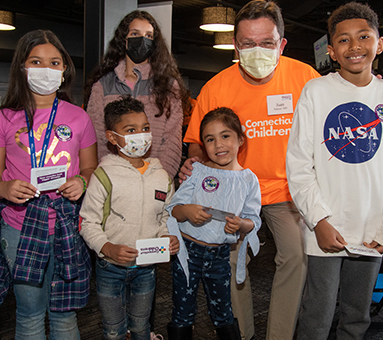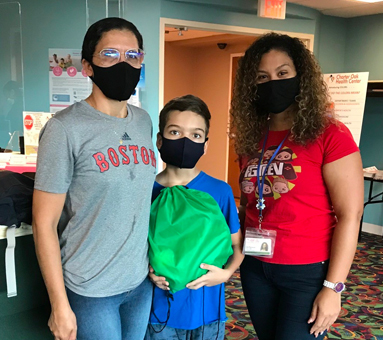Creating opportunities for everyone to have access to health care and healthy environments is crucial to reducing poor health outcomes.

LIFE EXPECTANCY
Strategies
We invest in programs and initiatives that offer: preventative and routine healthcare; developmental screenings; access to healthy food; promoting healthy behaviors and health-related income supports (such as, SNAP, WIC, and HUSKY). We’re also working in community partnerships focused on improving health outcomes across our region.

United Way 211
2-1-1 provides a one-stop connection for healthcare access, and health-related services and supports. 211 is there 24 hours a day, 7 days a week and 365 days a year to help people find what they need.
North Hartford Triple Aim Collaborative
The North Hartford Triple Aim Collaborative (NHTAC) is a multi-sector convening table focused on population health improvement. Residents and partner organizations from the business, non-profit, healthcare and government sectors are working together to identify gaps and elevate existing neighborhood-level health strategy that exemplifies the “triple aim” of improved well-being, improved population health and reduced healthcare system costs in the North Hartford Promise Zone.
Success Story
North Hartford Triple Aim Collaborative (NHTAC) was founded in 2017 to bring cross-sector leaders and individuals together to work on health and well-being initiatives in North Hartford. The Collaborative is an action-oriented partnership that mobilizes residents, community organizations, businesses and government to work together in new and different ways with United Way serving as the backbone for this group.
NHTAC has always put the community at the center of the work; but, over the last year, the membership prioritized embedding racial justice in all it does. For example, NHTAC updated its mission – to cultivate a healthy Hartford by advancing racial justice, equitable systems and community capacity – to explicitly call out the role of structural and systemic racism and how that contributes to inequal health outcomes between people of color and white people in our community. Research tells us that disparities in health and lifespan can be determined by the neighborhood you live in. According to DataHaven’s 2019 Greater Hartford Community Wellbeing Index, there is more than a six-year life expectancy gap between residents of the North Hartford Promise Zone (76.1 years), and their counterparts just four miles away in West Hartford (82.4 years).
The COVID-19 pandemic further emphasized the deep inequities that already exist in health. The challenges of the pandemic also required partners to work together in different ways which spurred innovation and gave way to new strategies rooted in a community approach. A silver lining is that these synergies have allowed United Way to expand our work in health improvement across more of our region.


